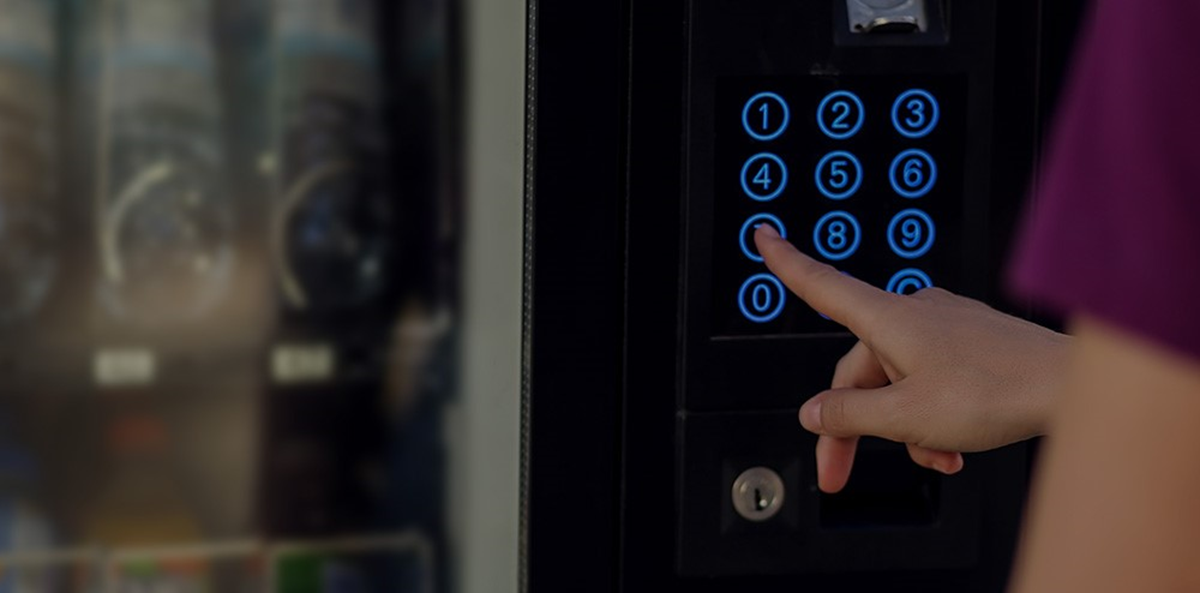How to get vending machine contracts

The key to success in the vending business is placing your machines where there’s a lot of foot traffic and product demand. Let's break down the steps for how to get vending machine agreements to help you secure profitable locations and position your business for long-term success.
Why vending machine contracts are important
Snack and beverage vending machine contracts help make your business more stable. When you secure a vending contract, you're guaranteed placement for a specific period — typically one to five years. Without a contract, your machines could be moved or replaced without warning, which can hurt your income. This stability allows you to scale your operation without worrying about unexpected interruptions and setbacks.
Contracts for bulk vending machines can also open doors to significant business growth and networking opportunities. If you're reliable and keep your snack machines stocked and maintained, property managers may recommend you to other building managers. These referrals can help you expand your operation with less marketing effort.
Perhaps most importantly, formal vending machine operator contracts give you a competitive advantage over vending businesses with informal arrangements. They demonstrate you’re committed to business relationships. If property ownership changes or new management takes over, written contracts protect your investment and prevent competitors from claiming your profitable locations.

Do I need a license or permit to place vending machines?
The first step in getting vending machine business contracts is to make sure you have the right licenses or permits and that you abide by all local laws and regulations. In most places, you’ll need a business license. You may also need a special vending machine permit or sales tax permit. Requirements vary significantly by state and city, and you'll need to contact your local governing authority or Small Business Administration office to understand what's required in your area.
If you sell food or beverages, you may also need to obtain approval from your local health department and go through regular inspections, especially for refrigerated or perishable items. Some areas also mandate training for cottage foods service operators, even if you're only selling prepackaged items.
Once you have your licenses and permits, you'll need written permission from property owners or managers before installing any equipment. This is typically done by reaching out with a proposal that outlines the terms.
Your proposal should include:
- How long your machine will stay
- Whether the revenue will be shared and at what percentage
- Who covers the electricity
- How maintenance issues are handled
- What products will be offered
- How often your machine will be restocked
When submitting your proposal, make it as professional as possible. Include photos of your machines, product lists, testimonials, and the key benefits of having your machines on their property, such as customer convenience.
Do I need an LLC for a vending machine business?
You're not legally required to form a limited liability company (LLC) to operate a vending machine business, but having one creates a legal separation between your personal and business assets. If someone is injured by one of your machines or your business is sued, an LLC protects your home, bank accounts, and other personal assets.
The steps to form an LLC vary by state, although it's usually quick and easy. Nearly all states let you apply online in just a few minutes. The approval may take a few days to process.
Types of vending machine contracts
An essential part of how to get vending machine operator contracts is to customize your contract for each potential client. Important contract considerations include where you’re placing your machine, the length of the agreement, and whether you’ll share a portion of the proceeds with the property owner.
Public vs. private locations
Where you intend to place your machines—in public or private locations—can affect the ease of landing contracts. Public locations can include government buildings, schools, libraries, and parks, while private locations can include office buildings, gyms, apartment complexes, and retail stores.
Public contracts often require more formal bidding, but they can offer high foot traffic and long-term stability. If you’re researching how to get a contract to place a vending machine, private locations may be easier to secure if you’re just getting started.
Short-term vs. long-term agreements
Short-term contracts can be lucrative as long as you place your machines where there’s a lot of traffic. For example, you might place machines at special events, festivals, or other potential locations where they’re only needed for a few days or weeks. The main downside of short-term contracts is you have to constantly search for new opportunities.
Long-term contracts, on the other hand, can provide steady income for months or years with less work. These arrangements make it easier to expand your operation without constantly chasing new placements.
Full-service vs. commission-based contracts
A full-service contract means you handle everything. You’re responsible for restocking products, maintaining the machine, collecting money, and paying a monthly fee to the location.
With a commission-based contract, you split the revenue with the property owner. You typically give them 5-25% of sales in exchange for the space for your machine. These deals may open doors to higher-traffic locations that property owners might not otherwise rent out.
What is a typical vending machine contract?
Vending machine contracts often have different terms — there’s no one-size-fits-all contract you can use. What’s in a contract typically depends on where you’re placing your machines and your negotiation with the property manager or owner.
Most vending machine contracts include:
- Parties involved: Identifies both the vending machine operator and the property owner, including their names, business information, phone numbers, and other contact information.
- Scope of vending services: Detailed description of the vending machines to be installed, including the type, quantity, and where they'll be placed.
- Installation and maintenance: Includes the steps for delivering and setting up the machines, assigns responsibility for repairs and routine servicing, and explains who covers any related costs.
- Revenue sharing: Outlines how the income generated by the vending machines will be divided between the vendor and the property owner. It may include fixed monthly fees, percentage-based commissions, or other payment arrangements agreed upon by both parties.
- Duration and termination: Specifies the length of the agreement and the conditions under which either party may end the contract, including required notice periods, renewal terms, and penalties for early termination.
- Product stocking and pricing: Details of how frequently the machines will be restocked, who’s responsible for refilling them, and any pricing guidelines.
- Liability and insurance: Clarifies which party is responsible for any damage, theft, or loss involving the vending machines, and outlines the insurance coverage each party must maintain to protect against potential claims.
- Compliance and regulations: Ensures the vending business will adhere to all local regulations and laws, including those about health and safety.
- Dispute resolution: Describes the process for handling any disagreements that may arise during the contract, such as mediation or arbitration.
How to find vending machine contract opportunities
Successful vending machine business operators typically use several strategies to secure contracts. While you may favor a particular strategy, relying on just one approach can limit your opportunities.
Cold outreach is one of the most effective ways to land vending machine contracts. It involves talking to property managers and telling them about the benefits they'll receive from installing your machines. You can often identify the person you need to talk to through online directories and property management companies. Cold outreach is a numbers game, and you’ll likely receive many rejections, which is why it’s important to follow up. You may have to talk to someone multiple times before they agree to a contract.
Don't overlook the power of networking to build relationships with property managers. Consider joining your local Chamber of Commerce and attending local networking events and trade shows. These connections may lead to contracts or referrals. Forming partnerships with schools, hospitals, or larger employers in your area is another way to open doors to new contracts.
How do I win vending machine contracts?
The key to securing vending machine contracts is presenting your business as professional and reliable. You can do that by creating a formal proposal that highlights your machines, product selection, service schedule, and revenue potential. Include photos of your equipment, samples of your products, and a schedule that shows you'll keep your machines maintained and fully stocked.
You'll also want to be flexible on pricing and the commission structure to appeal to different clients. Some managers may prefer the simplicity of a flat monthly fee, while others will want a percentage of the revenue. You could also create a referral program where you offer a flat fee for recommending your services to other managers. This helps you grow your network with less work.
Demonstrating you're a legitimate business helps build trust. Be sure to include a certificate of insurance (COI) and copies of your business license and permits. Including references from existing clients can help position your business as trustworthy and professional.
How much commission should I offer to a location owner?
Commission rates for vending machine placements can vary significantly based on location, foot traffic, and negotiation skills. Typically, most arrangements are for 5-25% of the monthly sales.
High-traffic locations like shopping malls, airports, transit centers, or busy office complexes typically expect a higher percentage because a strong sales volume is practically guaranteed. In contrast, locations with lighter traffic might be satisfied with a lower rate or even just the convenience of having a machine on-site.
Be sure to research what other vending machine operators in your area are offering to make sure your proposal is competitive. Also, don't forget to factor in all of your expenses to make sure your offer allows for a good profit margin after your net sales.
Can having the right kind of insurance help you win vending machine contracts?
Having the right types of insurance can give you a competitive edge when pursuing vending machine contracts. Managers are often concerned about liabilities, and they may be more willing to approve your proposal if they know you're covered for third-party incidents.
Policies you may need include:
General liability insurance
General liability insurance protects against third-party injuries. For example, someone might trip over a cord or get hurt while retrieving an item from your machine. This coverage helps pay legal fees, damages, and medical expenses if you’re sued.
Commercial property insurance
Commercial property insurance protects your vending machines and inventory from theft, vandalism, or damage.
Business owner’s policy
A business owner's policy (BOP) is a cost-effective way to buy general liability and commercial property insurance together. Bundling policies is typically more affordable than buying them separately.
Business personal property insurance
Business personal property insurance protects machines, inventory, and supplies that are stored at a central location. This can often be added as an endorsement of a general liability policy.
Workers’ compensation insurance
Workers' compensation insurance is legally required in most states if you hire employees to restock or maintain machines. It covers medical bills and lost wages if an employee is injured while working.
Cyber insurance
Cyber insurance has become increasingly important as more vending machines are connected to the internet for payment processing and remote monitoring. This type of coverage helps you recover from data breaches or cyberattacks.
Commercial umbrella insurance
Commercial umbrella insurance provides extra protection by increasing coverage limits on your general liability, employer’s liability, or commercial auto insurance policies once the policy limit is reached.
Commercial auto insurance
Commercial auto insurance covers accidents involving your business vehicles, such as a truck or van that’s used to transport vending machines and inventory. Each state has its minimum requirements for vehicle liability coverage.
Finished stock insurance
Finished stock insurance offers an additional safety net for the products inside your machine. It protects against theft, fire, natural disasters, and vandalism.
Having the right types of insurance can give you a competitive edge when pursuing vending machine contracts.
Tips for managing your vending machines
While your vending machine business can make money for you around the clock, you'll need to carefully monitor performance. Consider using a vending management system, which provides real-time information on your sales and popular products, and lets you know when machines need restocking.
You’ll also need to ensure your machines work properly and are clean. Property managers notice when vending machines are consistently well-maintained and stocked. They're far more likely to renew contracts with operators who take care of their equipment than with operators who let machines sit empty, broken, or dirty.
Be sure to communicate with property managers to resolve issues quickly and to maintain good working relationships. Keep them updated on any changes to your service schedule, products, or repairs. Being easy to work with increases the chances of long-term partnerships.
Get vending machine business insurance with Insureon
It's easy to get insurance for your small business with Insureon. Just fill out an online application to receive quotes from trusted providers. Our expert insurance agents are available to answer any questions and help you find the best small business insurance for your needs.
Most small business owners can get same-day coverage and easily download a certificate of insurance (COI) as soon as they purchase a policy.
Cyrus Vanover, Contributing Writer
Cyrus is a finance and insurance writer who is passionate about helping people and businesses succeed. He is also the author of the book "Earn a Debt-Free College Degree." He has written for some of the largest financial institutions in the country including TD Bank, Citizens Bank, and many credit unions. Cyrus has also contributed to Newsweek. Based in the Blue Ridge Mountains of Virginia, he enjoys hiking the local trails and exploring old Civil War battlefields and other historical sites in his spare time.









